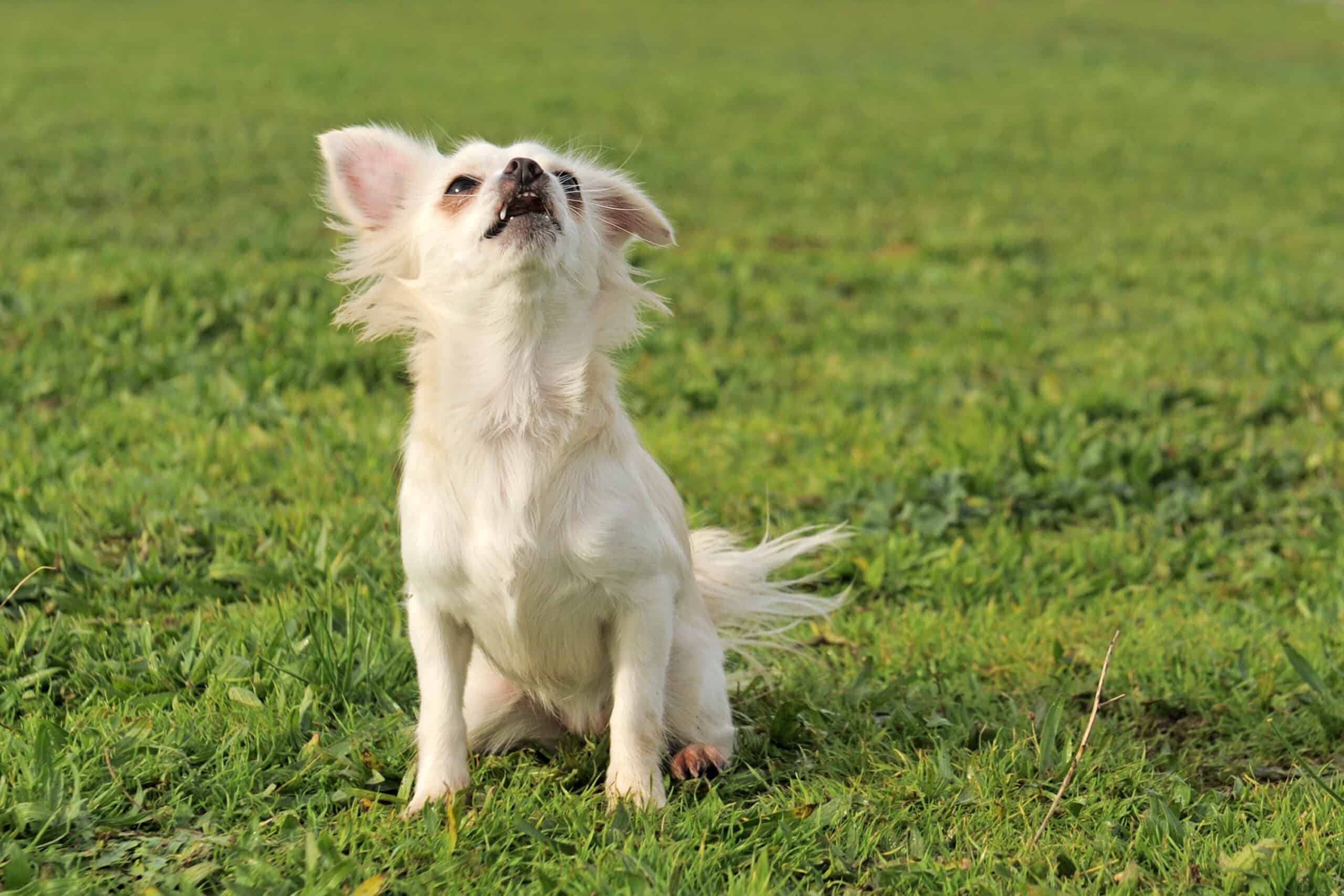If you’re considering getting a Chihuahua, or already have one, you may be wondering, “Do Chihuahuas bark a lot?”
Known for their tiny size and big personalities, Chihuahuas are a popular breed of dog. But, their barking habits can be a concern for some potential owners.
Chihuahuas are known for being vocal dogs and can bark a lot. They are a territorial breed and may bark to protect their home and family.
Additionally, they may bark out of excitement, anxiety, or boredom.
While excessive barking can be a nuisance, it’s important to understand that barking is a natural behavior for dogs and can be managed with proper training and care.
In this article, we’ll explore the reasons behind Chihuahuas’ barking, how much they bark, and what you can do to help manage their barking habits.
Table of Contents
Understanding Chihuahua Behavior

Chihuahuas are vocal dogs that are known for their tendency to bark a lot. Understanding their behavior can help you manage their barking habits.
In this section, we will discuss the communication and instinct of Chihuahuas, as well as the common reasons for their barking.
Communication and Instinct
Chihuahuas are known for their territorial and protective instincts. They are quick to bark at strangers and other dogs to protect their owners and their territory.
They also bark out of excitement, fear, and anxiety. Chihuahuas use barking as a way to communicate their feelings and needs.
Common Reasons for Barking
There are several reasons why Chihuahuas bark a lot. Some of the common reasons include:
- Attention-seeking: Chihuahuas are social dogs that crave attention. They may bark to get your attention or to let you know that they want to play.
- Anxiety: Chihuahuas are prone to anxiety, and they may bark when they feel stressed or uncomfortable.
- Boredom: Chihuahuas are energetic dogs that need plenty of exercise and mental stimulation. When they are bored, they may resort to barking to release their pent-up energy.
- Pain or discomfort: Chihuahuas may bark when they are in pain or discomfort. If your Chihuahua is barking excessively, it’s important to rule out any underlying health issues.
- Loneliness: Chihuahuas are social dogs that don’t like to be left alone for long periods. They may bark when they are feeling lonely or neglected.
- Dementia: As Chihuahuas age, they may develop dementia, which can cause confusion and disorientation. They may bark excessively as a result.
- Dreaming: Chihuahuas may bark in their sleep when they are dreaming.
It’s important to identify the reason behind your Chihuahua’s barking and address it accordingly.
With patience and consistent training, you can teach your Chihuahua to bark less and be a better-behaved companion.
Training and Behavior Modification
If you’re a Chihuahua owner struggling with excessive barking, the good news is that there are effective ways to train your dog to stop barking excessively.
With consistency, positive reinforcement, and patience, you can teach your Chihuahua to control their barking behavior.
Basics of Training a Chihuahua
Training a Chihuahua requires patience and consistency.
Start by socializing your dog and providing mental stimulation and exercise to help prevent boredom and attention-seeking behavior.
Engage your Chihuahua in activities that challenge them mentally and physically, such as obedience training, agility, or games of fetch.
When training your Chihuahua, use positive reinforcement and reward-based training methods.
Avoid using punishment or negative reinforcement, which can lead to fear and anxiety. Consistently reinforce good behavior with treats, praise, and attention.
Addressing Excessive Barking
If your Chihuahua has a problem with excessive barking, it’s important to address the behavior problem early on.
One effective way to train a Chihuahua to stop barking is to teach them a quiet command. When your dog starts barking, say “quiet” in a firm but calm voice.
When they stop barking, reward them with a treat or praise.
Another effective way to control excessive barking is to use a bark collar. Bark collars emit a harmless spray or sound that interrupts barking behavior.
However, it’s important to use bark collars responsibly and only as a last resort.
In addition to training and behavior modification, it’s important to create a positive environment for your Chihuahua.
Provide a comfortable and secure living space, and give your dog plenty of attention and engagement.
With patience and consistency, you can train your Chihuahua to stop excessive barking and enjoy a happy, healthy life.
Health and Wellness
Chihuahuas are generally healthy dogs, but like all breeds, they can be prone to certain health issues.
Regular visits to the veterinarian can help ensure that your Chihuahua stays healthy and happy.
Physical Exercise and Play
Chihuahuas are energetic and playful dogs that require regular exercise and playtime to stay healthy and happy.
Daily walks and play sessions can help burn off excess energy and keep your Chihuahua fit and active.
However, it’s important to remember that Chihuahuas are small dogs and can easily become overheated or fatigued, so it’s important to monitor their activity levels and provide plenty of breaks and water.
Mental Stimulation and Socialization
In addition to physical exercise, mental stimulation and socialization are also important for your Chihuahua’s health and wellbeing.
Chihuahuas are intelligent and playful dogs that enjoy learning new things and engaging with their owners.
Interactive toys, puzzles, and training sessions can help provide mental stimulation and prevent boredom.
Socialization is also important for Chihuahuas, as they can be prone to anxiety and shyness if not properly socialized.
Introducing your Chihuahua to new people, places, and experiences can help build their confidence and prevent behavioral issues.
Overall, regular exercise, playtime, mental stimulation, and socialization are key components of your Chihuahua’s health and wellbeing.
By providing your Chihuahua with plenty of opportunities for engagement and interaction, you can help ensure that they lead a happy and healthy life.
Environmental Factors and Management
Chihuahuas are known for their excessive barking, and the environment in which they live can have a significant impact on their barking behavior.
By creating a supportive environment and managing external triggers, you can help your Chihuahua bark less and live a happier, more peaceful life.
Creating a Supportive Environment
To help your Chihuahua bark less, it’s essential to create a supportive environment that meets their needs.
Make sure your Chihuahua has plenty of toys to play with and gets enough exercise to burn off excess energy. A tired Chihuahua is less likely to bark excessively.
Additionally, provide your Chihuahua with a comfortable and secure space to call their own.
This can be a crate or a designated area in your home where they can retreat when they feel anxious or overwhelmed.
By giving your Chihuahua a safe and secure space, you can help them feel more in control and less likely to bark out of fear or anxiety.
Dealing with External Triggers
External triggers, such as loud noises or unfamiliar people, can cause your Chihuahua to bark excessively.
To manage these triggers, it’s important to train your Chihuahua to remain calm and relaxed in different situations.
This can be done through positive reinforcement training, where you reward your Chihuahua for good behavior.
You can also help your Chihuahua feel more comfortable in different environments by exposing them to new sights, sounds, and smells gradually.
By gradually introducing your Chihuahua to new experiences, you can help them build confidence and reduce their anxiety.
Finally, it’s important to be aware of your Chihuahua’s territorial instincts and protective nature.
Chihuahuas are known for being excellent watchdogs, but they can also become overly protective of their territory.
If your Chihuahua barks excessively at neighbors or other dogs, it may be necessary to limit their exposure to these triggers and provide them with more controlled environments.
By creating a supportive environment and managing external triggers, you can help your Chihuahua bark less and live a happier, more peaceful life.
Remember to be patient and consistent in your training, and always reward good behavior.
With time and effort, you can help your Chihuahua become a well-behaved and happy companion.
Understanding Breed Characteristics
Chihuahuas are a small breed of dog that are known for their yappy and vocal nature. While some people find their barking endearing, others find it annoying.
In this section, we will discuss the breed characteristics that contribute to their vocalization and how they make excellent companion and watchdogs.
Genetic Traits and Vocalization
Chihuahuas are a breed that is predisposed to barking due to their genetics. They are vocal dogs and are known for their yappy nature.
It is important to note that not all Chihuahuas bark excessively, but it is a common trait of the breed.
Their vocalization is a way of communication and attention-seeking behavior. They bark to alert their owners of potential danger or to get attention.
They also growl and whine to communicate their needs and wants.
Chihuahuas as Companion and Watchdogs
Chihuahuas make excellent companion dogs. They are loyal and affectionate to their owners, and they enjoy being around people.
They are also known for their watchdog abilities. They are alert and will bark to alert their owners of potential danger.
As watchdogs, they are excellent at alerting their owners of intruders or strangers.
They may be small, but they have a big personality and will do everything in their power to protect their owners.
In conclusion, Chihuahuas are a vocal breed that is known for their yappy nature. Their vocalization is a way of communication and attention-seeking behavior.
They make excellent companion and watchdogs and are loyal and affectionate to their owners.
Check out our big gallery of Chihuahua pictures here.
Frequently Asked Questions – Do Chihuahuas Bark a Lot?
Why might a Chihuahua bark more at night?
Chihuahuas are known to bark more at night because they are alert and protective of their owners.
They might hear something outside that they perceive as a threat, such as other animals or people passing by.
Additionally, they might bark more at night if they are not getting enough exercise or attention during the day.
What are some effective methods to reduce excessive barking in Chihuahuas?
There are several methods to reduce excessive barking in Chihuahuas, including positive reinforcement training, providing enough exercise and mental stimulation, and using anti-bark devices such as citronella collars or ultrasonic devices.
It is important to identify the root cause of excessive barking and address it accordingly.
Can Chihuahuas be considered good companions for families?
Yes, Chihuahuas can be great companions for families as they are affectionate, loyal, and playful.
However, due to their small size, they might not be suitable for families with young children who might accidentally hurt them.
It is important to supervise interactions between children and Chihuahuas to ensure their safety.
What triggers a Chihuahua to bark at unfamiliar people?
Chihuahuas might bark at unfamiliar people due to their protective nature and strong territorial instincts.
They might also bark due to fear or anxiety, especially if they have not been socialized properly.
It is important to introduce Chihuahuas to new people and situations gradually and positively to prevent excessive barking.
How much sleep do Chihuahuas typically need?
Chihuahuas typically need around 12 to 14 hours of sleep per day, although this can vary depending on their age and activity level.
It is important to provide them with a comfortable and quiet sleeping area to ensure they get enough rest.
Is excessive barking a common trait in all Chihuahuas?
While Chihuahuas are known for their tendency to bark more than other breeds, excessive barking is not a common trait in all Chihuahuas.
It is important to address excessive barking behavior through training and proper socialization to prevent it from becoming a problem.

